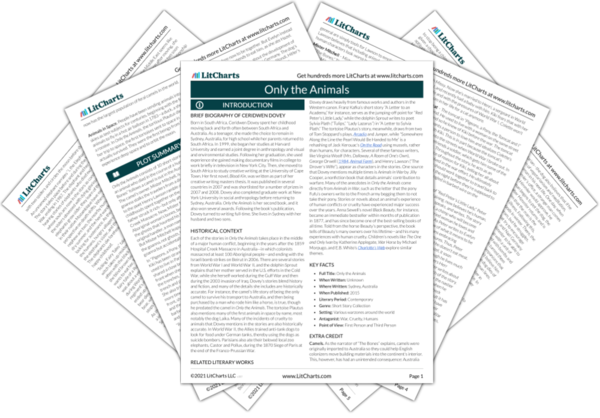In Only the Animals, food represents humans’ capacity for both kindness and cruelty, particularly as it relates to the way they treat animals. Many of the stories depict humans offering food to animals during wartime, when food is extremely scarce. Food, then, becomes symbolic of people’s ability to choose selflessness over selfishness—through giving food to animals who are also starving, people can feel good about themselves and feel like they’re doing something good for others. This is why, in “Pigeons, a Pony, the Tomcat and I,” the tomcat warns Kiki not to turn up her nose at any food the soldiers might offer her. Feeding her, he suggests, might be the only thing keeping the soldiers going until they’re called away from the front to rest. Similarly, in “Telling Fairy Tales,” the narrator explains that soldiers regularly make the pilgrimage to the Sarajevo zoo to throw bread crusts to the two remaining bears in the zoo. The bread crusts aren’t enough to sustain the bears, but it nevertheless makes the soldiers feel like they’re helping.
In some circumstances, though, food becomes a way for people to assert their dominance over animals. For instance, the dog’s Master, Himmler, decides that his dog should join him in taking up vegetarianism. This, Himmler believes, will improve his dog’s karma and even increase the odds that his dog will one day be reincarnated as a human. For the dog, this creates a difficult dilemma: as a natural carnivore, he loves meat and is constantly hungry while on a vegetarian diet. But he also so desperately wants to be human and to make Himmler happy that it seems worth it to follow a diet that makes him feel awful. The book underscores that for many domestic animals or those living in captivity, what they eat—and whether they eat at all—is totally contingent on their human caretaker’s kindness.
Food Quotes in Only the Animals
“Don’t eat any of it,” I said.
The tomcat looked offended at my suggesting he would take the food. “I have my own adopted soldier. But you should eat what he’s offering even if you’re not hungry. You might be the only thing keeping him alive until he’s rotated out of the front line and can get some rest.”

Unlock explanations and citation info for this and every other Only the Animals quote.
Plus so much more...
Get LitCharts A+Frau Oberndorff gave me a pet cricket. The cricket lives in a walnut shell. If you hold him up and look at him directly, he looks fierce. The man who brought the cricket to the zoo said he would win battles against other crickets if we first chop up a fly and feed it to him to make him violent.
I was starving. My Master had recently begun to follow a vegetarian diet and decided that I should give up all meat too, in keeping with his beliefs [...] Not only that, he was concerned about my karma. He had promised me that if I did as he said, ate no meat, resisted my urge to hunt foxes, and tried to meditate once a day, I might be reincarnated as a human being in my next life. A human being! The thought was intoxicating.
“I’m waiting for her to die so I can eat her.” He chewed at the bread.
“Why wait?” asked the witch.
“People would stop risking their lives, dodging sniper bullets to bring me bread, if they thought I had no heart, eating her while she’s still half alive,” the bear said.
It was dark in the zoo by now, darker than it had ever been before the siege started, for the city of Sarajevo no longer relied on electricity. It had become medieval, lightless, its citizens forced to fetch water from underground springs and to wash by candlelight. And the zoo was no longer a modern thoroughfare for the ogling masses. Now the few who dared visit brought sacred offerings of food. The two last remaining animals had become central to the city’s very survival, to the idea of the city’s survival.
“But you must see what sort of position this would put us in. Smuggling two bears out of Sarajevo in a food-relief convoy—what does that say to the people left behind? Why bears, not babies? I mean, a busload of children trying to get out of the city was fired on, and we’re spending time worrying about these wild animals? We can’t allow it, I’m afraid.” He was the only one who had not brought stale bread in his pockets for the bears.












